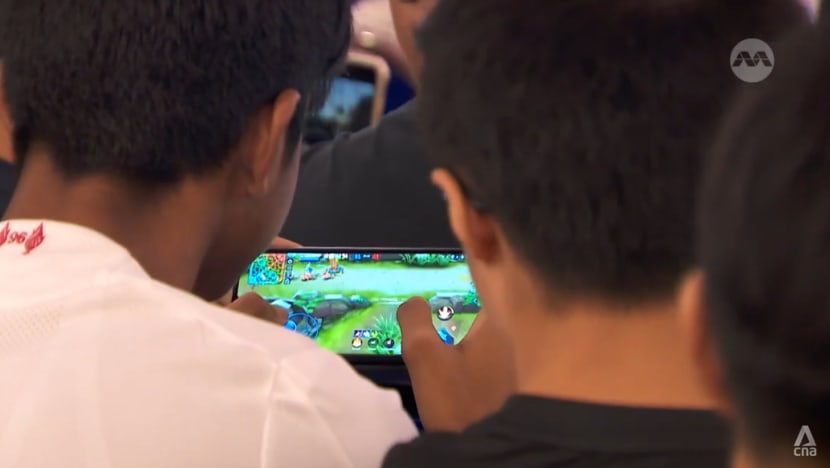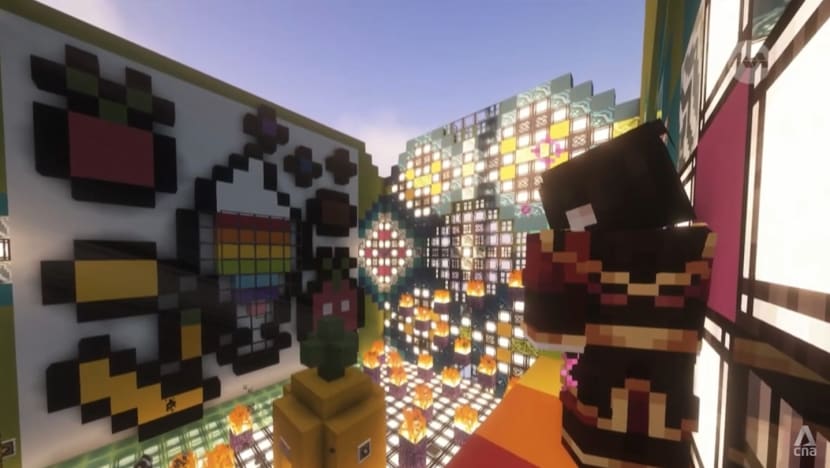Rise in youth gaming addiction due to more enticing games and smart devices, say counsellors
Therapists noted a 30 per cent increase in gaming addiction cases since the COVID-19 pandemic, adding that youths make up most of the cases.

Youth play games on mobile phones.

This audio is generated by an AI tool.
SINGAPORE: Therapists and counsellors said more enticing games developed in recent years and the prevalence of smart devices have led to a rise in gaming addiction cases.
Mr Chai Binhua, a counsellor at addiction recovery centre We Care Community Services, told ┬ķČ╣ he has seen a 30 per cent increase in people seeking help for video game and device addictions since 2019.┬Ā
He added that youths make up more than 80 per cent of the cases he sees at the centre.┬Ā
Mr Chai noted that many of these games encourage players to log on frequently with daily missions, which provide them with a sense of progression and achievement by performing easy but time-consuming tasks.
He added that many cases of such addiction involve games featuring micro-transactions such as loot boxes or other mechanics that tempt players to make in-game purchases to receive random virtual items.
Experts said loot boxes have similar addictive qualities to gambling as they provide players chance-based outcomes of receiving varying virtual items ŌĆō including highly coveted ones ŌĆō at a seemingly reasonable price.
Dr Geraldine Tan, principal psychologist at The Therapy Room, has likewise noted an increase in cases of device addiction at her clinic.
ŌĆ£Pre-COVID, we've had probably five to six out of 10 parents coming in complaining about their kids on their devices. Now, (we) have almost seven to eight out of 10 parents,ŌĆØ she said.
GAMING ADDICTION CAN LEAD TO SELF-ISOLATION
Those with serious gaming addiction often show signs of self-isolation, neglecting school or work, and refusing to participate in social and family activities, said Dr Tan.
"One of these cases that I have ŌĆō he was on the computer for an extensive amount of time ŌĆ” that he even failed college. He bought ŌĆ” different gadgets ŌĆ” to facilitate his playing," she said.
Psychotherapist Narasimman Tivasiha Mani said parents should regulate their childrenŌĆÖs screen time rather than taking their devices away, as the latter could worsen their feelings of isolation.
ŌĆ£I've had clients that (turned) aggressive because the parents turned off the device,ŌĆØ said the co-founder and executive director of Impart, a community-based youth mental health charity.┬Ā
He added that gaming served as a coping mechanism during the pandemic for 70 per cent of the youths he works with, who used the virtual world for social interaction during periods of lockdown.
Experts said many such youths continued fulfilling their social needs online after the pandemic instead of returning to offline engagements.
ŌĆ£Gaming addiction ŌĆ” makes them stuck in some way,ŌĆØ said Mr Tom Maniatis, a senior addictions therapist at Promises Healthcare, adding that social isolation could have implications on an ageing society like Singapore.
OVERCOMING GAMING ADDICTION
Mr Maniatis said that many gaming addicts treated by his clinic had undiagnosed conditions including attention deficit hyperactivity disorder (ADHD), autism, depression and anxiety, leading them to use games as a coping mechanism.
Mental health advocates said that addressing underlying issues faced by patients is important to overcoming gaming addiction.
For example, family therapy could be helpful for those who turned to gaming as a means of escape from dealing with family issues, they said.
Dr Tan noted parents should set boundaries on their childrenŌĆÖs gaming activities and advised them to seek help early if they suspect excessive behaviour.
This is because gaming addiction, beyond affecting a childŌĆÖs development, can have lasting effects that extend well into adulthood that could continue to interfere with employment, and social and mental well-being.
ŌĆ£A child, teen or even young adult may not know how to cope with (trauma) and (they) take to the device, and lose themselves in the device,ŌĆØ Dr Tan said.
Youths who require help with gaming addiction can speak to various organisations such as REACH, a community-based service consisting of professionals who work with school counsellors to address studentsŌĆÖ mental health needs.
Counselling centres are also working on virtual platforms for youths to seek help from therapists. Some are even gamifying such apps ŌĆō in line with their target audienceŌĆÖs interests.

Mr Narasimman said that Impart has used the Minecraft sandbox game to create a virtual setting where healthcare workers can interact with gaming addicts to teach them life skills.
ŌĆ£What we want to do is to create healthy spaces in the metaverse for these young people ŌĆ” we don't want to deprive them of that opportunity of connection and community,ŌĆØ he said.












